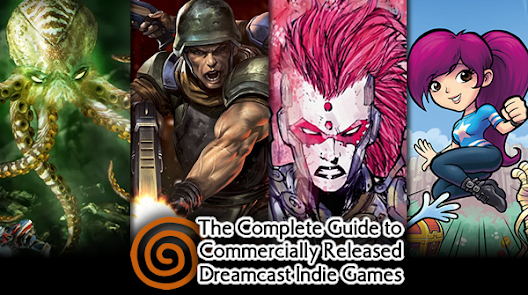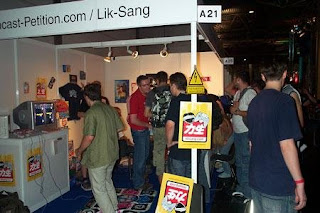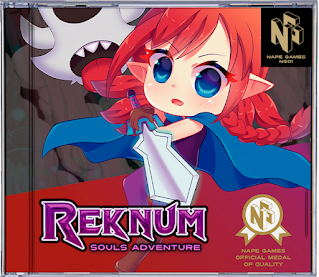It’s August 2022 and the Dreamcast renaissance shows no signs of petering out. All kinds of talented and creative folks from across the world clearly haven’t had their fill of the little white dream machine just yet, and a plethora of projects continue to be announced left, right and centre. But how are you supposed to keep tabs on this whirlwind of activity? Don’t you worry, the Junkyard is here to report on all the latest from the Dreamcast cosmos. Buckle up for a bumper news round-up freshly sourced from our network of highly informed sleuths.
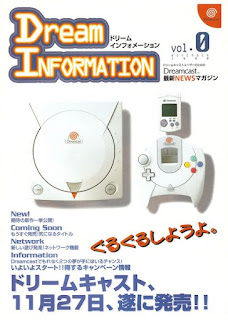 |
Move aside 'Dream Information' the DCJY News Round-up is the only game in town now.
|
Four new indie releases, Jeremy? That’s insaneIn the recent past DCJY writers have salivated over the possibility that the indie release schedule of 2022 and 2023 would turn out to be ram packed. Of course, those who are a little longer in the tooth may know that announced indie games sadly don’t always make it through to completion or can fall into cycles of delays, but fortunately this has not been an issue in recent months, with four new titles landing so far this summer.
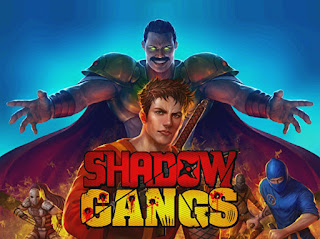
Shadow Gangs, the hotly anticipated Shinobi-esque side-scrolling beat em’ up, dropped in June. The Dreamcast release was finally made possible by a Kickstarter campaign that met its funding goal in March, after which the developers JKM Corp conspired with Wave Game Studios to rapidly turn out the physical release. Those who want to know more should check-out the publisher’s website, the handful of reviews that have quickly surfaced (The Dreamcast Junkyard, RetroFaith, Games Freezer), or have a gander at the various gameplay videos available on the likes of Youtube and Twitch.
Two further releases quickly followed
Shadow Gangs in June. Hailing from sunny Spain,
Nape Games made their maiden voyage into Dreamcast territory with the release of
Ploid and
Renkum Souls Adventure. Both are pitched as action-adventure 2D platformers, each with their own distinctive stories that appear to link-up with worlds that have already been built-up over the course of Nape Games prior releases. Relatively little has been reported on the Dreamcast releases of these two titles so far – perhaps because the initial print-runs were quite limited. The publishers have hinted that
a re-print could be on the cards in the future though, so be sure to keep those eyes peeled.
The final new indie release of the summer season,
Mawthorne, shares a common thread with the Nape Games duo in that it was also primarily developed for the NES. Where it differs though, aside from being an entirely new IP, is in its simultaneous release on the Dreamcast and the NES. No waiting around here - the Dreamcast bound MIL-CDs shipped out alongside the cartridges in July. Details on this ‘metroidvania platform-adventure’ game can be found over on
its Kickstarter page. Fingers crossed a re-print of the Dreamcast version will be coming down the line for those who missed out on the Kickstarter. As with the Nape Games duo, I can’t comment on the quality of this release, as I haven’t got my grubby mits on it, but with a bit of luck reviews will start to surface soon.
More indie releases on the horizon
Of course, there are shedloads of indie releases and re-releases on the horizon too. Read on for a rapid-fire rundown of the forthcoming games:
- 240p Test Suite – $24.99, due Q3 2022. Developed by Artemio, published by VGNYSoft. “A homebrew software suite for video game consoles developed to help in the evaluation of capture cards, upscalers, upscan converters, line doublers and of course TV processing of 240p video and scaled signals.”
- Andros Dunos II - €34.90, due Q3 2022. Developed by Picorinne soft, published by JoshProd. A new side-scrolling shmup that is an officially licensed sequel to Visco’s 1992 Neo Geo game.
- Big2Small - $39.99, release date unknown. A cutesy puzzle adventure game, developed and published by RetroRoomGames, due for release on the Game Boy, N64 and Dreamcast. Pre-sales have been live since the end of May.
- Driving Strikers - £???, development due to be finished by Q4 2022. Driving Strikers does what it says on the tin. You drive about in a car striking a ball into goals. Good, old-fashioned, no-nonsense football with cars, just like your ancestors played. Of course, the game will also mark a HUGE milestone upon release as it will be the first indie Dreamcast game to feature online play. The developer Kazade has indicated that he hopes to wrap the game’s development up before the end of 2022 and has also confirmed he intends for a physical product to be produced, although a publisher has not yet been confirmed. Get hyped for full lobbies from day one.
- Flight of the Amazon Queen - $24.99, due TBA 2022. Developed and published by RetroSurge. This Dreamcast port of a classic point-and-click game has been on the cards for quite some time now. Postponements have occurred in the past, so we wouldn’t be shocked if the game doesn’t reach completion this year. Fingers crossed the details begin to be firmed up soon.
- Hermes (re-release) - $29.99/$59.99, due Q3 2022. Developed by RetroGuru, published by VGNYSoft. Many will already be familiar with this little jump n’ run game, given that it was originally released on the Dreamcast in 2017. Aside from new box art, this re-release is most notable for the Limited Edition package which features a custom green VMU.
- Metal Canary - £???, release date unknown. A promising vertical shmup developed by Titan Game Studios and Frost Byte Games, first revealed in June 2021. It seems likely that a playable demo will be made available by year-end. Follow the Metal Canary Twitter account for gameplay footage and development updates.
- Non-Casual Encounter - £???, due Q4 2022. Developed by SEGASaturno Productions, Non-Casual Encounter will be the first graphic novel indie game to be released on the Dreamcast. The prologue (demo) released in December of last year was well received, despite being very short.
- Xenocider (re-release) - $39.99, due Q3 2022. Developed by Retro Sumus, published by VGNYSoft. The impressive 3D rail shooter gets a re-release targeted at North American audiences with new box artwork.
Basically then, there are more forthcoming Dreamcast releases than you will know what to do with. Let me tell you something, the Dreamcast hasn’t even begun to peak. And when it does peak, you'll know. Because it’s gonna peak so hard that everybody in Philadelphia's gonna feel it.
Mods, hardware and other tinkerings
A slew of announcements about newly invented modifications, improved hardware, and all kinds of other productive tinkerings have been coming in thick and fast this summer. While you’ve been touring Skeggie’s penny arcades and ice-cream vans on your summer hols’, others have clearly been hard at work…
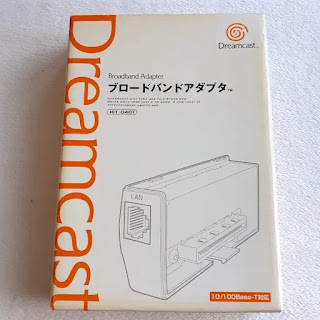 |
Scrivani has been busy ensuring owners of the elusive Broadband Adapter can get a little more value out of their peripheral. If you have one, get it out of that dusty box and get online!
|
Following on from his 2021 invention of a method that allowed Broadband Adapter users to notify others of the games they are playing via DreamcastNow, Scrivani has recently produced a guide on how to use a DreamPi (I.E. a Raspberry Pi configured to enable online play via a simulated dial-up connection) as a WiFi to ethernet repeater. In lay terms, this configuration facilitates the use of the Broadband Adapter over WiFi. So, no more trip hazards from an ethernet cable snaking down the stairs to your router. Admittedly the use of this functionality is likely to be limited, but if you are one of the privileged few who make active use of a Broadband Adapter, then you should definitely check it out.
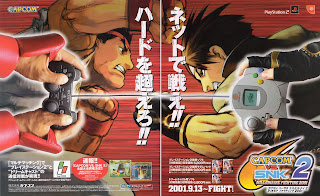 |
Capcom vs. SNK 2 was notable for allowing cross-platform play by Dreamcast and PS2 players on the KDDI service.
|
Sticking with the online theme but moving onto ground that may have a wider appeal, at the end of May, Dreamcast Talk user ‘dude22072’ revealed that they had undertaken some
serious efforts to reverse engineer the online capabilities of the suite of Dreamcast games which were formerly playable online via the KDDI service in Japan. The KDDI service was what enabled a large chunk of Capcom games - including the likes of
Heavy Metal Geomatrix, Marvel vs. Capcom 2, and
Spawn: In the Demon’s Hand – to be played online. Given the number of games involved, this is significant progress in terms of the ongoing online revival of the Dreamcast. To be clear, the online functions of these games have not actually been restored yet, and there is no guarantee that they ever will be, but a big step forward has nevertheless been made (serious enough for the online restoration of these games to now be considered
work in progress on the Dreamcast Live website).
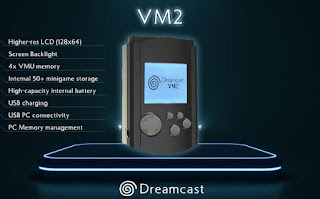 |
No 'beeeeeep' sound from a dead battery? How can the VM2 miss this essential feature!?
|
Those who don’t play their Dreamcast online (sacrilege!), don’t fear, as there is some news that may interest you too. Chris Daioglou has released an update on the progression of the creation of the ‘VM2’, a modernised Visual Memory Unit with a whole host of upgrades, including a rechargeable battery, an improved screen and a MicroSD card slot. A funding campaign for the VM2 is due to launch via Indiegogo on the 1st of September, so you won't need to wait too much longer to part with your hard earned cash. Earlier this month, 8BitMods also publicly stated their intention to produce their own VMU but have kept quiet about precisely what this will entail, given that they are only in their initial stages of development.
Last but not least
During its tragically short official lifespan, countless games were reported to be in development for the Dreamcast which never actually saw the light of day. Some of the titles that were all but complete, such as Half Life and Propellor Arena are well known, and leaked playable versions have been available for years. However, there are others that remain shrouded in mystery. Thankfully, lately pcwzrd13 has put his detective skills into action, tracking down and speaking with the developers who would have worked on these unreleased Dreamcast games, thereby setting the record straight on what was genuinely in the works and what was simply salacious gossip. He posted an extensive list of initial findings on the Dreamcast-Talk forums in May, including some quotes directly from the developers, and has been updating this on occasion since then.
 |
The mock-up cover design for Mike Phelan's exhaustively comprehensive forthcoming guide.
|
Early on in August, the Junkyard’s own Mike Phelan announced he had finally reached a cut-off point for his forthcoming tome ‘The A-Z of Dreamcast Games’, confirming that the tally of games which it will cover is a whopping 703. Hopefully this means we can stop lusting over the photos of the mock-up edition and have the real deal in our hands before the year is out. Furthermore, thanks to the selfless efforts of those who continue to reliably pump out translations – such as Cool Cool Toon which a team including Derek Pascarella has recently begun work on – a growing chunk of the Japan exclusive titles covered by the book are playable by English-language audiences.
So, that’s all for now folks. New indie releases, revived online games on the horizon, beefed-up VMUs, translations, and hefty books with as many pages as an old school Argos catalogue. What more could you want?
OK, OK, one last snippet of news, if you must insist. If you’d like to meet the Junkyard’s very-own Lewis and Tom, in person, then make sure you head to the Nottingham Video Games Expo on the 17th and 18th of December. Autographed headshots will be available but please be sure to form an orderly queue.



















